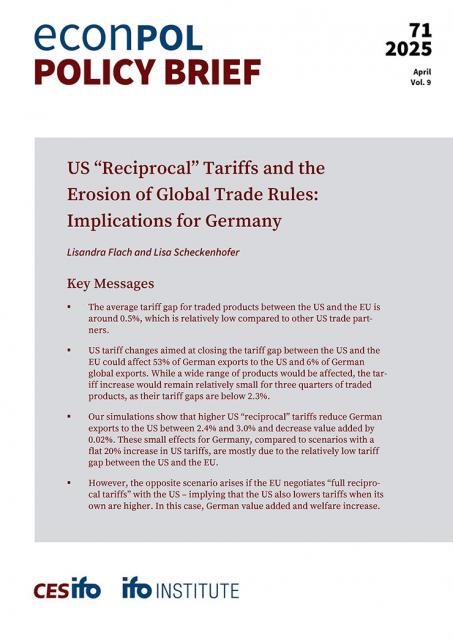News Archive

Working Paper: The Case for Co-Financing the CAP
|
EconPol Working Paper
| News
The Common Agricultural Policy (CAP) was set up in a time when the memory about post-war food shortage was fresh, Europe was a large net importer of agricultural products, agricultural production was highly labour-intensive and significant shares of the work-force received their major income from the agricultural sector. Today, agricultural production is capital-intensive with a low share of total labour employed and food spending. Read in this paper by network member Friedrich Heinemann/ZEW why CAP in its current size is still part of the problem and which conclusions should be urgently drawn.
... Details

Working Paper: Firm Responses to an Interest Barrier - Empirical Evidence
|
EconPol Working Paper
| News
Finnish VATT Institute for Economic Research scientists Jarkko Harju, Ilpo Kauppinen and Olli Ropponen have studied the interesting effects of an interest barrier that was introduced in Finland to restrict the profit-shifting opportunities of multinational enterprises (MNEs). Our Nordic EconPol Europe Partners found that Finnish MNEs responded to the interest barrier by decreasing their financial expenses, but not only.
... Details

Working Paper: Europe at the Interdependence War
|
EconPol Working Paper
| News
The EMU has been founded on the exclusive national responsibility doctrine, except for monetary sovereignty devoted to a single bank. Italian economist Roberto Tamborini, Università di Trento, speaks out on why the strong interdependent linkages among the partner countries impair the national responsibility notion and make the country-by-country approach of the EMU policies so dramatically harmful.
... Details

Policy Brief: Why are Macroeconomic Imbalances so Important for the EMU?
|
EconPol Policy Brief
| News
Are convergent growth rates a sine-qua-non condition for a monetary union? Is there any economic tendency towards this outcome? Economist Roberto Tamborini, Università di Trento, says: "Higher growth across Europe is a valuable aim but is the devotion to pro-growth and convergence policies and to the formalisation of the convergence process in Europe's Economic and Monetary Union the correct answer? The EconPol Europe network partner recommends quickly having a closer look.
... Details

Working Paper: Deadly Embrace - Sovereign and Financial Balance Sheets Doom Loops
|
EconPol Working Paper
| News
The recent unravelling of the Eurozone’s financial integration raised concerns about feedback loops between sovereign and banking insolvency. Jean Tirole, Nobel Memorial Prize Winner in Economic Sciences, and French Harvard top economist Emmanuel Farhi provide their theory of the feedback loop that allows for both domestic bailouts of the banking system and sovereign debt forgiveness by international creditors or solidarity by other countries. The theory has extremely important implications for the re-nationalization of sovereign debt, macroprudential regulation, and the rationale for banking unions.
... Details
